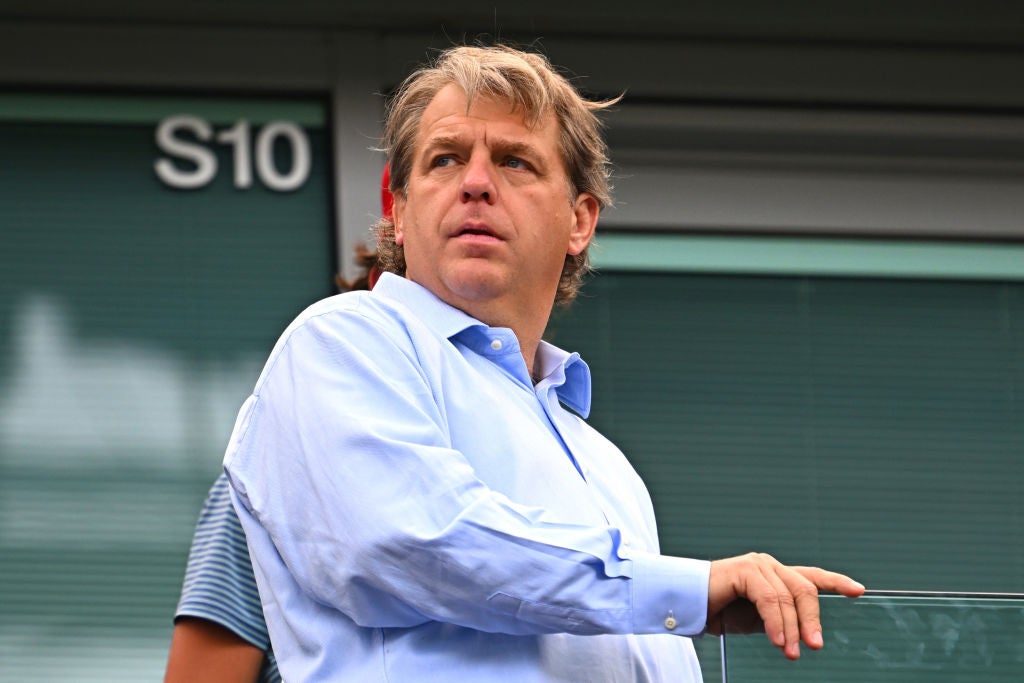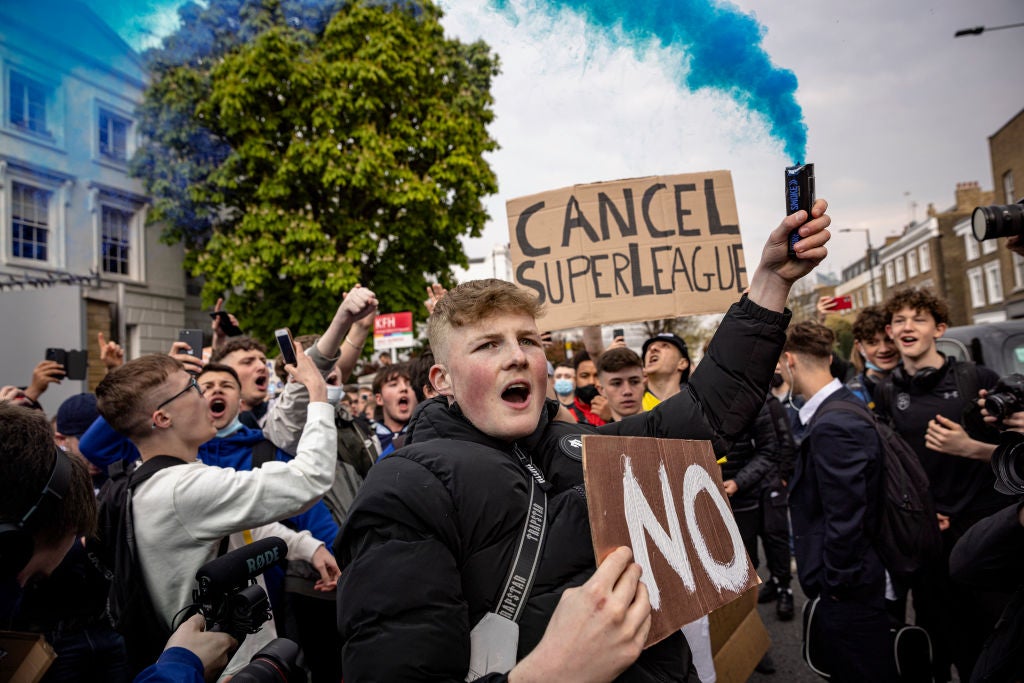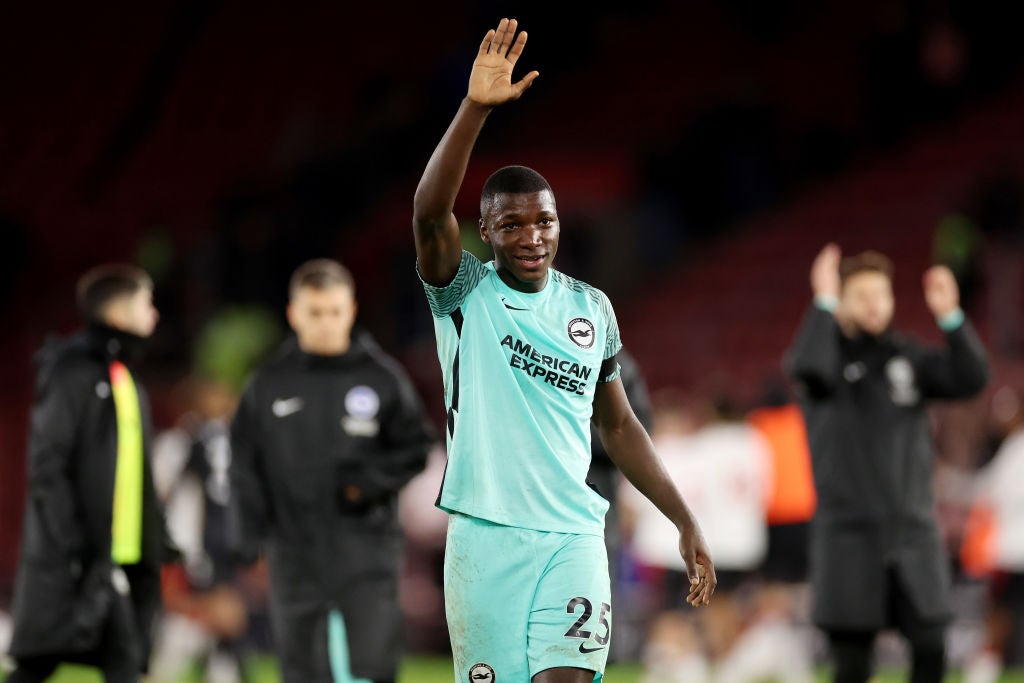Why Chelsea’s obscene January spending is just the start
Chelsea’s eye-watering transfer window is damaging for the game, but the club’s new owners are not done yet after a record-breaking month

Your support helps us to tell the story
From reproductive rights to climate change to Big Tech, The Independent is on the ground when the story is developing. Whether it's investigating the financials of Elon Musk's pro-Trump PAC or producing our latest documentary, 'The A Word', which shines a light on the American women fighting for reproductive rights, we know how important it is to parse out the facts from the messaging.
At such a critical moment in US history, we need reporters on the ground. Your donation allows us to keep sending journalists to speak to both sides of the story.
The Independent is trusted by Americans across the entire political spectrum. And unlike many other quality news outlets, we choose not to lock Americans out of our reporting and analysis with paywalls. We believe quality journalism should be available to everyone, paid for by those who can afford it.
Your support makes all the difference.As the hours ticked by in the tortuous talks for Enzo Fernandez, the Chelsea negotiation team were insisting it could be done. Todd Boehly was determined. The approach the club have taken – beyond being willing to spend as much as they can – is that if there is some kind of problem that prevents a deal, they will try and solve it there and then.
The problem in this case was Benfica’s insistence that Fernandez’s release clause be paid, with Chelsea making a lot of offers on structure. They ultimately worked a way around that, though, while keeping within their own Financial Fair Play (FFP) calculations. Benfica have become famous for how assertive they are in negotiations, but Chelsea are already renowned for their distinctive approach, and infamous for that expenditure.
It is like “the early days of the Roman Abramovich spending sped up”, in the words of one senior football figure, who complained “they are in everyone’s business”.
Chelsea's £300m-plus spend this January is not just more than the entire Premier League in this window last year. It’s the first time in history one club has outspent all of the other four major leagues combined.
That is not good for the sport or any ideas of competitive balance. It certainly isn’t something to celebrate as if it’s some kind of victory.
Many in those leagues, mind, would stress that it’s just a continuation of a problem that is seeing the Premier League evolve into its own Super League at the expense of everything else. Southampton after all followed by Chelsea by becoming the second club to spend more than every other major league combined.
The contrast is troubling.
All of La Liga, Serie A and Ligue 1 collectively made a net profit of over €90m (£80m), with the Bundesliga almost breaking even at €2m (£1.8m) net expenditure.
The Premier League spent over €300m (£265m) before you even bring in Chelsea. From there, the numbers pile so high that they start to lose any meaning, other than as a display of power and the absurdity of the situation we’re in.
Take the headline deal: the British record paid for Fernandez, 22, is the sort of money that would usually go for a player who is already one of the five best in the world. It is not the money that usually goes for someone bought for a mere €10m (£8.9m) just a few months ago and has only played 29 games for his last club – even allowing for his potential and that World Cup performance.
That it comes in a cost of living crisis makes it obscene.
That it comes a week before the government publishes a white paper on football makes it all the more pointed, especially as one of the core issues is redistribution of resources.

There are big questions over what the meaning of all this is, and where the game is actually going. The Premier League earns so much money but what is that money actually doing, other than kind of calcifying the competition itself, with teams spending to conserve their place in it?
So much of the money just swirls around the top end of the game, in fees and wages. It is almost galling to think that the £3m that would have been less than the commission in countless deals could have easily bought Scunthorpe United and prevented so much prior worry from their fans.
The Premier League themselves are always at pains to insist that some of this down to the circumstances. Brexit means they don’t get access to younger players and that the points system for a visa also raises prices. They would point to how 4 per cent goes back into the academy system, that many of the sales fund the rest of Europe and that there’s a flow to the English Football League.
Many others would dispute this. The EFL would say you only have to look at the figures as to how that money doesn’t flow down any more. There were only four January deals that saw the Premier League actually pay money to the three divisions below them, and they barely amounted to £25m. So much for the financial flow, that so many stakeholders are imploring the white paper to assess.
There’s then that flow of money to Europe. Needless to say, it is not that the Premier League is also propping up the other major leagues, it’s that those leagues can’t financially compete.
The flow of money to the Premier League is too great, and trickle-down economics never work. The very fact such arguments are being uttered, however, only shows how the Premier League has so thoroughly embraced a very modern form of football Thatcherism.
There are otherwise deepening concerns about the future of European football itself, which is why more and more are beginning to see the merits of an alternative Super League. “It will soon be the Premier League and only the Premier League,” as one executive privately complained on Tuesday afternoon.

In all of this, it shouldn’t be overlooked there is obviously some meaning to the business in a purely football sense. Arsenal’s purchase of Jorginho may not have been bombastic but it was astute, as it gives them crucial depth and options in the title race. On the other side of that, Pep Guardiola made a typically counter-intuitive move in simply getting rid of Cancelo for the benefit of his squad chemistry.
Manchester United may well have been as clever as Arsenal in bringing in Wout Weghorst and then acting decisively for Marcel Sabitzer when it was confirmed Christian Eriksen was injured.
If we are talking about intelligence, though, Brighton have become a beacon. They are a badly needed example of true insight and efficiency in a competition as lavishly ostentatious as this, and there is almost a moral lesson in how they kept Moises Caicedo. They are seeing years of proper planning coming together. They deserve to get into Europe, or maybe even win the FA Cup.
The Premier League has long proved, however, that it isn’t really about what’s “deserved”. It is usually about what is spent.
Tottenham Hotspur, Leicester City and Leeds United did bolster their squads in that regard, strengthening their chances in their own respective races. Liverpool didn’t really even with Cody Gapko. Everton certainly aren’t spending their way out of trouble – they didn’t spend anything.
Saudi Arabia’s Newcastle United, for their part, aren’t really railroading their way into the Champions League. Anthony Gordon for an initial £40m, potenitally rising to £45m, is hardly cheap but he isn’t outlandish.
He’s nothing compared to major incomings at Stamford Bridge, that bring this window to a key point.
Everything that was expected from Newcastle actually came from Chelsea. It has been unprecedented – for the Premier League, for January, and for this type of ownership. It certainly wasn’t what was expected from an American-dominated private equity fund.
Even figures within the Premier League itself were pointing to it as an “outlier”. Chelsea have accelerated even this market. It influences all around them. There’s a fair argument that Caicedo would not have cost so much if Chelsea weren't spending this much.

And given the point of the Newcastle project is sportswashing, the obvious question is what the meaning here is? It is obviously pure business, but how much makes business sense?
The foundational argument for all of this is that Chelsea’s owners see fundamental inefficiencies in the football market, and that is what they are seeking to exploit. That explains the emphasis on young players and long contracts, as they aim to build the next great squad in football.
A constant counter-argument has been that these “inefficiencies” exist for a reason and it can be very expensive to have underperforming players anchored to you for long deals.
Sources with knowledge of the Chelsea project say it’s bigger than all of that. They think the club was underpriced when they bought it given football’s burgeoning global popularity, and that it will be worth double that in five to 10 years. This is essentially capital investment, then. They are confident all of their calculations are correct for FFP, especially as more players who aren’t being amortised – such as academy graduates – are sold over the next two windows.
That means they are also prepared to spend even more. The willingness to seriously invest in all of this is there, and The Independent has been told that the next two years will see more of the same lavish transfer business as they completely reshape the squad.
That is what they are building, overseen by a different way of looking at the game. It isn’t necessarily good for the wider game.
Just as everyone talks about the end, though, it might be the start.



Join our commenting forum
Join thought-provoking conversations, follow other Independent readers and see their replies
Comments